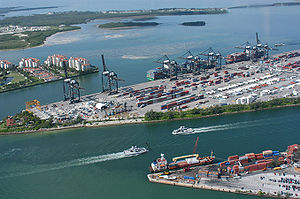PortMiami
| Port of Miami | |
|---|---|

Aerial view of the Port of Miami
|
|
| Location | |
| Country | United States |
| Location | Miami, Florida |
| Coordinates | 25°46′27″N 80°10′16″W / 25.77417°N 80.17111°W |
| Details | |
| Type of harbor | Natural/Artificial |
| Draft depth | 42 feet (13 m) |
| Employees | 176,000 |
| Port Director | Juan Kuryla |
| Statistics | |
| Vessel arrivals | 2,489 |
| Annual cargo tonnage | 7.42 million |
| Passenger traffic | 4.33 million |
| Annual revenue | $94.70 million |
| Formerly | Port of Miami |
| Draft depth | 50 feet |
| Air draft | unrestricted |
|
Website PortMiami |
|
The Dante B. Fascell Port of Miami, now stylized as PortMiami, is a seaport located in Biscayne Bay in Miami, Florida, United States. It is connected to Downtown Miami by Port Boulevard—a causeway over the Intracoastal Waterway—and to the neighboring Watson Island via the Port of Miami Tunnel. The port is located on Dodge Island, which is the combination of three historic islands (Dodge, Lummus and Sam's Islands) that have since been combined into one. It is named in honor of 19 term Florida Congressman Dante Fascell.
As of 2011, the Port of Miami accounts for 176,000 jobs and has an annual economic impact in Miami of $18 billion. It is the 11th largest cargo container port in the United States. In 2010, a record 4.33 million passengers traveled through the Port of Miami.
Early in the 1900s when a powerful hurricane hit Miami, it split the southern end of Miami Beach creating Government Cut and what is now known as Fisher Island. Shortly afterward, the cut was dredged along with a new channel to what now is known as Bicentennial Park in downtown Miami. This new access to the mainland created the Main Channel which greatly improved the shipping access to the new port. From these original dredging spoils which were disposed on the south side of the new Main Channel, new islands were inadvertently created which later became Dodge, Lummus and Sam's Island along with several other smaller islands.
As the port grew through the years as a result of the improved shipping access and growth of the South Florida community, it also needed additional lands to expand its operation. As such, on April 5, 1960 the Dade County Board of Commissioners approved Resolution No. 4830, "Joint Resolution Providing for Construction of Modern Seaport Facilities at Dodge Island Site" which on April 6, 1960 the City of Miami approved the same as City Resolution No. 31837 to construct the new Port of Miami. Soon thereafter, work began on constructing the new port on Dodge Island by expanding the island and joining it other islands in the general vicinity. Then upon construction of the new seawalls, transit shed 'A', the administration building and a new vehicle and railroad bridge, the operations were transferred from the mainland port to the new port on Dodge Island. Thereafter through the years, additional fill material from dredging enlarged the islands of Lummus and Sam's along with the filling of the North, South and NOAO slips, creating the new port which is built on a completely man made island.
...
Wikipedia
